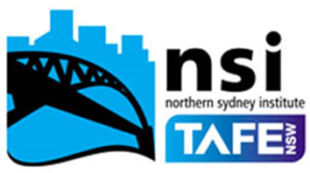Benchmarking Roundtable Series (BRS) Workshops
Overview
THE-ICE’s annual Benchmarking Roundtable Series (BRS) Workshops provide an opportunity for collegial sharing and peer support between educators and researchers from vocational, private, and higher education sectors, as well as industry and government representatives, with a focus on developing and improving world of standards.
Participants are given an opportunity to share their own experiences in a group brainstorming sessions, exploring topical issues, themes and ideas. The BRS serves as an opportunity for educators, researchers, and administrative staff from participating institutions to gain insight into the practices of peer institutions, and consider alternative and new approaches to develop best-practice models and collectively identify solutions to common issues being faced.
Chronicle of past BRS Workshops
THE-ICE BRS XIII, 2018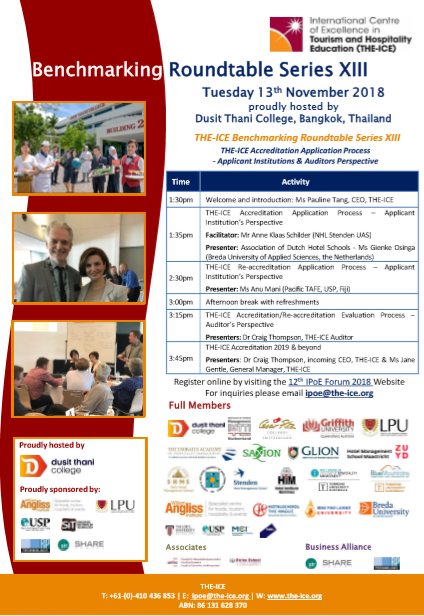
Proudly hosted by Dusit Thani College, Thailand, on 13 November 2018 as part of THE-ICE 12th IPoE (International Panel of Experts) Forum 2018.
Focus: THE-ICE Accreditation Application Process – Applicant Institutions & Auditors Perspective
Esteemed guest presenters included:
- Ms Pauline Tang, Chief Executive Officer, THE-ICE
- Mr Anne Klaas Schilder, Project Coordinator, NVAO & THE-ICE Joint Accreditation Projects. View presentation.
- Ms Gienke Osinga, Dean, Academy of Hotel and Facility Management, Breda University of Applied Sciences. View presentation.
- Ms Anu Mani, Manager, Quality and Accreditation Unit at Pacific Technical and Further Education (Pacific TAFE), University of the South Pacific, Fiji. View presentation.
- Dr Craig Thompson, incoming Chief Executive Officer, THE-ICE, Scotland, United Kingdom.
- Ms Jane Gentle, General Manager, THE-ICE. View presentation.
Proudly hosted by:

THE-ICE BRS XII, 2017
Proudly hosted by William Angliss Institute, Melbourne, Australia, on 12 November, 2017 as the Pre-Forum Workshop of THE-ICE 11th IPoE (International Panel of Experts) Forum 2017.
Focus:
- Benchmarking vs Ranking.
- Challenges of International Accreditations Standards vs National Standards.
- Teaching and Learning Outcomes (TLO).
- Project Champion: Virtual Field Trip.
Esteemed guest presenters included:
- Ms Pauline Tang, Chief Executive Officer, International Centre of Excellence in Tourism and Hospitality Education (THE-ICE) & Vice-President, International Network for Quality Assurance Agencies in Higher Education (INQAAHE).
- Mr Anne Klaas (A.K.) Schilder MA, Project Coordinator – NVAO & THE-ICE Joint Accreditation Projects.
- Dr Paul Whitelaw Associate Director Higher Education and Quality, William Angliss Institute, Melbourne, Australia. View Presentation.
- Associate Professor Pierre Benckendorff, University of Queensland. View Presentation.
- Associate Professor Anoop K Patiar, MBA, PhD, Griffith University – Tourism & Hotel Management & Project Leader (Virtual Field Trips). View Presentation.
- Dr Richard Robinson, Senior Lecturer, University of Queensland. View Presentation.
Proudly hosted by:

THE-ICE BRS XI, 2016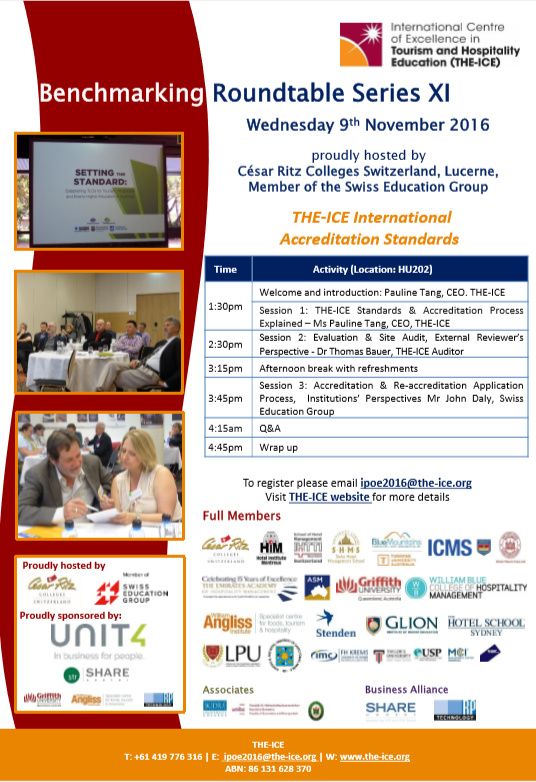
Proudly hosted by Cesar Ritz Colleges Switzerland in Lucerne, Switzerland, on 9 November, 2016 as the Pre-Forum Workshop of THE-ICE 10th IPoE (International Panel of Experts) Forum 2016.
Focus:
- THE-ICE Standards & Accreditation Process Explained.
- Evaluation & Site Audit, External Reviewer’s Perspective.
- Accreditation & Re-accreditation Application Process, Institutions’ Perspectives.
Esteemed guest presenters included:
- Ms Pauline Tang, Chief Executive Officer, International Centre of Excellence in Tourism and Hospitality Education (THE-ICE). View presentation.
- Dr Thomas Bauer, Auditor, THE-ICE Assessment Panel.
Proudly hosted by:

THE-ICE BRS X, 2015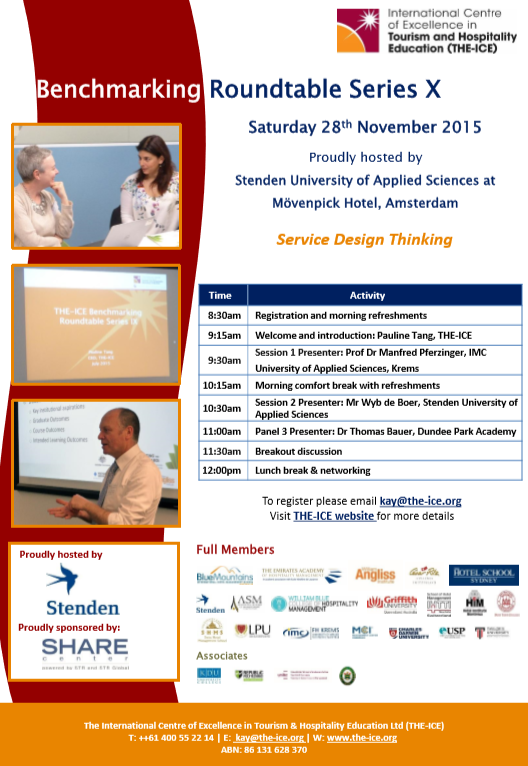
Proudly hosted by Stenden University of Applied Sciences, Stenden Hotel Management School and School of Leisure & Tourism Management, Leeuwarden, the Netherlands, at the Mövenpick Hotel, Amsterdam, the Netherlands, on 28 November, 2015. This event was held as the Pre-Forum Workshop of THE-ICE 9th IPoE (International Panel of Experts) Forum 2015.
Focus:
- Service Design Thinking.
Esteemed guest presenters included:
- Prof Dr Manfred Pferzinger, IMC University of Applied Sciences, Krems, Austria.
- Mr Wyb de Boer, EFTI (European Futures Tourism Institute), and Stenden University of Applied Sciences, the Netherlands.
- Dr Thomas Bauer, Auditor, THE-ICE Assessment Panel. View presentation.
Proudly hosted by:

THE-ICE BRS IX, 2015
Proudly hosted by Blue Mountains International Hotel Management School, Sydney, Australia, on 24 July, 2015.
Focus:
- The role of TLOs (Teaching and Learning Outcomes).
- How to leverage your institutional ISB-SBTM survey data.
Esteemed guest presenters included:
- Dr Paul Whitelaw, Associate Director Higher Education and Quality, William Angliss Institute, Melbourne, Australia. View presentation.
- Ms Pauline Tang, Chief Executive Officer, International Centre of Excellence in Tourism and Hospitality Education (THE-ICE). View presentation.
Proudly hosted by:
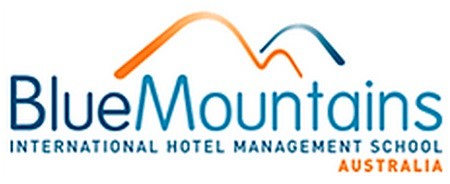
THE-ICE BRS VIII, 2014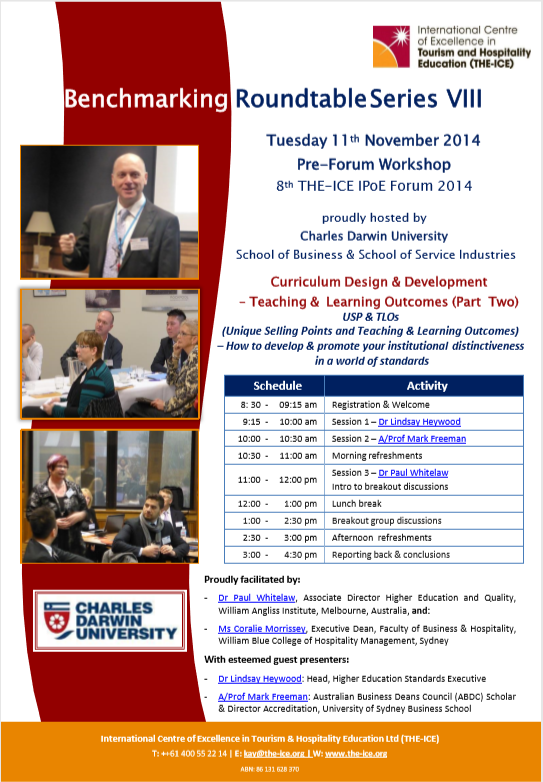
Proudly hosted by Charles Darwin University School of Business and School of Service Industries, Darwin, Australia, on 11 November, 2014 as the Pre-Forum Workshop of THE-ICE 8th IPoE (International Panel of Experts) Forum 2014.
Focus:
- Curriculum Design and Development – Teaching and Learning Outcomes.
- Unique Selling Points and Teaching and Learning Outcomes – how to promote your institutional distinctiveness in a world of standards.
Esteemed guest presenters and facilitators included:
- Dr Lindsay Heywood, Head, Higher Education Standards Executive. View presentation.
- A/Prof Mark Freeman, Australian Business Deans Council (ABDC) Scholar & Director Accreditation, University of Sydney Business School. View presentation.
- Dr Paul Whitelaw, Associate Director Higher Education and Quality, William Angliss Institute, Melbourne, Australia. View presentation.
- Ms Coralie Morrissey, Executive Dean, Faculty of Business & Hospitality, William Blue College of Hospitality Management, Sydney, Australia.
Proudly hosted by:

THE-ICE BRS VII, 2014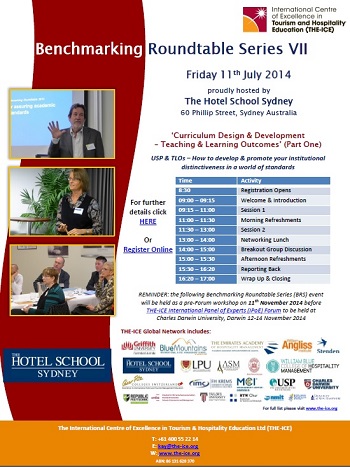
Proudly hosted by The Hotel School Sydney, Sydney, Australia, on 11 July, 2014.
Focus:
- Curriculum Design and Development – Teaching and Learning Outcomes.
- Unique Selling Propositions and Teaching and Learning Outcomes – how to promote your institutional distinctiveness in a world of standards.
Following the preliminary findings of the Office of Learning and Teaching’s Threshold Learning Outcomes Standards Project (OLT-TLO) being released at the first symposium on 1-2 July, 2014 (Melbourne), discussions included:
- USP & TLOs (Unique Selling Propositions and Threshold Learning Outcomes)
- Organisation uniqueness while maintaining identity and mission
- OLT-TLO & TEQSA
- Assurance of outcomes
Dr Paul Whitelaw of William Angliss Institute, Melbourne, heads the current OLT-TLO Standards Project. His facilitation of this event enabled members to come together, reflect, and work on models, as well as draw some benchmarking statements from the OLT-TLO preliminary findings. Reflections included how institutions can develop their unique/ distinctive position, and how the Higher Education Standards Panel (HESP) guidelines can be used to develop courses, curriculum, pedagogy, and assessment so that “assurance of learning” at the TLO level may be provided. Participants were given an opportunity to share their own experiences in a group brainstorming session, enabling identification of key areas by exploring the issues, themes and ideas that need to be considered when developing an institutional position, and courses that drive that position. View Presentation.
Esteemed guest presenters also included:
- Dr Scott Richardson – Blue Mountains International Hotel Management School, Australia. View Presentation.
- Dr Paul Weeks – The Hotel School Sydney, Australia. View Presentation.
- Mr Stuart Wiggins – William Blue College of Hospitality Management, Australia. View Presentation.
- A/Prof Mark Freeman – Australian Business Deans Council (ABDC) Scholar, Australia. View Presentation.
Providing collegial sharing and peer support educators & researchers from vocational, private and higher education sectors, as well as industry and government representatives, attended this event which focussed on developing and promoting institutional distinctiveness in a world of standards.
Proudly hosted by:

THE-ICE BRS VI, 2013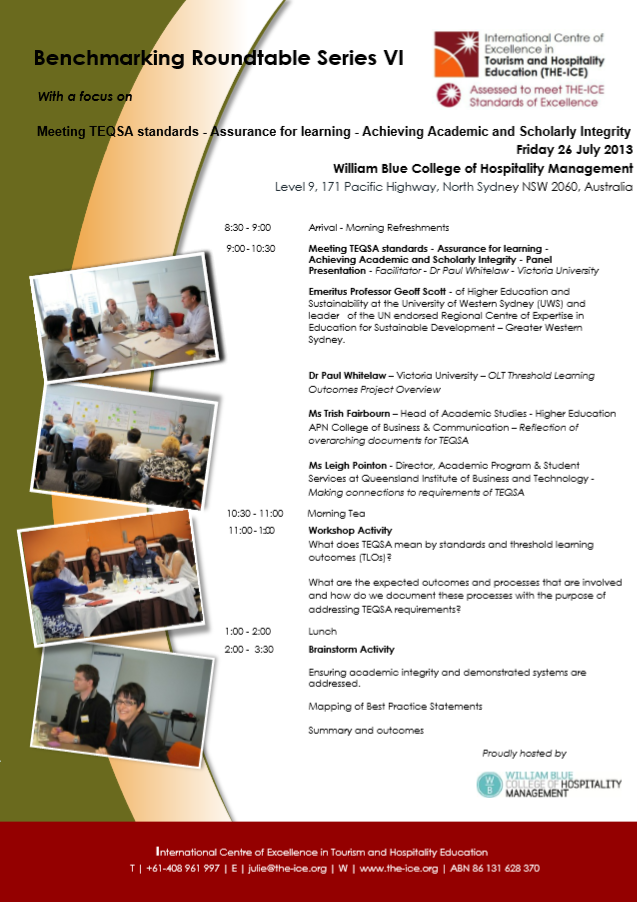
Proudly hosted by William Blue College of Hospitality Management, Sydney, Australia, on 26 July, 2013.
Focus:
- Meeting TEQSA Standards.
- Assurance for Learning.
- Achieving Academic and Scholarly Integrity.
Esteemed guest presenters and facilitators included:
- Emeritus Professor Geoff Scott, Higher Education and Sustainability, the University of Western Sydney & leader of the UN endorsed Regional Centre for Expertise in Education for Sustainable Development, Greater Western Sydney. View Presentation.
- Dr Paul Whitelaw, Victoria University. View Presentation.
- Ms Trish Fairbourn, Head of Academic Studies, Higher Education APN College of Business & Communication. View Presentation.
- Ms Leigh Pointon, Director, Academic Programme & Student Services, Queensland Institute of Business and Technology. View Presentation.
Educators and researchers from vocational, private, and higher education sectors attended this series of roundtables, discussing key questions such as:
- What does TEQSA mean by standards and threshold learning outcomes (TLOs)?
- What are the expected outcomes and processes that are involved, and how do we document those processes?
- What standards should be put in place to ensure academic and scholarly integrity for tourism, hospitality and event management graduates?
Participants were given an opportunity to share their own experiences relating to TEQSA, and what documentation and processes were involved with the purpose of addressing TEQSA requirements.
A group brainstorming session was held to identify areas of concern and strategically drill into these issues and how we go about demonstrating assurance for learning as part of our pursuit of academic and scholarly integrity.
The pursuance of academic integrity for both students and academic staff is paramount, and workshop outcomes will provide participants with a clear knowledge and understanding of how to address and document academic and scholarly integrity for the purpose of meeting TEQSA requirements.
The inference of this Series was on meeting TEQSA requirements, with a focus on meeting National Academic Quality Framework (NAQF) outcomes and benchmarking statements, which provide potential best practice models for our global members to use as frames of reference in meeting their respective national best practice requirements.
Overview of OLT Project – Exemplary Academic Integrity
The Exemplary Academic Integrity Project, an Office of Learning & Teaching (OLT) project, aims to extend and embed the five core elements of exemplary academic integrity policy identified by a recent ALTC project (Bretag et al 2010-2012) – access, approach, responsibility, detail and support – across the Australian Higher Education sector. Central to these elements is a commitment by providers to fostering a culture of academic integrity.
As support is crucial to enact exemplary policy, this OLT project will develop resources accessible to both public and private higher education providers to embed these elements.
Two critical areas identified by Bretag et al (2012) are addressed in this project. First, support systems will be developed for vulnerable student groups including international English as an Additional Language (EAL) students, and educationally less prepared students who struggle to understand the concept of academic integrity without assistance. Second, the lessons about exemplary academic integrity policy and support frameworks will be extended to include higher degree by research (HDR) students.
Proudly hosted by:
![]()
THE-ICE BRS V, 2013
Proudly hosted by Northern Melbourne Institute of TAFE, Preston, Victoria, Australia, on 5 April, 2013.
Focus:
- Ethics and values within tourism and hospitality education curriculum.
As ethics, values, corporate social responsibility (CSR), climate change, and sustainability are becoming increasingly important, this workshop was designed to consider ways to engage our students at a philosophical, conceptual and practical level. The workshop was attended by educators and researchers from vocational, private, and higher education sectors, who considered, discussed and debated the following key issues:
- What is ethical behaviour and how can this be put into practice?
- What values should tourism and hospitality graduates possess?
- How do we instil these values in our graduates?
- What are the barriers and challenges in developing these values?
- How can ethics and values be brought into the curriculum?
- Should they be part of the formal or informal curriculum space?
The workshop was attended by educators & researchers from vocational, private and higher education sectors.
Proudly hosted by:
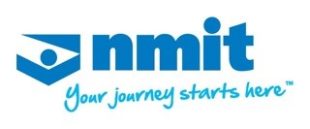
THE-ICE BRS IV, 2012
Proudly hosted by Blue Mountains International Hotel Management School, Sydney, Australia, on 7 September 2012.
Focus:
- Curriculum Design – Assessment and Learning Outcomes/Graduate Attributes
Esteemed guest presenters included:
- Ms Lynn Richardson, William Angliss Institute. View presentation.
- Dr Paul Whitelaw, Victoria University. View presentation.
- Mr Ron Hilvert, Managing Director, The Emirates Academy of Hospitality Management Dubai. View presentation.
THE-ICE Benchmarking Roundtable Series IV focused on Assessment and Learning Outcomes/Graduate Attributes and how institutions operate within the standards of Australia’s regulatory and quality agency, Tertiary Education Quality and Standards Agency (TEQSA). Vocational, private, and higher education institutions are required to provide substantial proof and evidence that all areas of assessment and graduate outcomes meet the regulatory standards of TEQSA, and the presenters raised/presented the following:
The challenges of streamlining between the VET and HE and the quality in assessment and related learning outcomes.
The “extra-curricular curriculum”, a planned set of activities and support facilities that sits alongside, complements and interfaces with the formal academic curriculum.
Advantages of having strong industry links for internships and employment of graduates, and faculty development and consultancy opportunities.
Challenges of in/compatibility of policies between SBUs and the school, potentially creating unrealistic students expectations of employment and education not viewed as a commercially driven endeavour.
Dr Paul Whitelaw Victoria University presented an overview of The project titled “Building a Stronger Future: Australian Tourism, Hospitality & Events Education” This project was led by Dianne Dredge Southern Cross University through the Office for Teaching & Learning (OLT) and aims to map the tourism, hospitality and events curriculum space and to build a foundation of information from which we can start to discuss important issues about curriculum design, content, delivery, academic standards and graduate outcomes. The objectives of the project are to:
- Promote better understanding about the global-local context
- Conceptualise and map the tourism, hospitality and events curriculum space
- Develop baseline data about programmes and curriculum space
- Explore and document stakeholder interests and values
- Inform discussions about the future of tourism, hospitality and events education
The work provides the baseline for a comprehensive discussion about the totality of hospitality, tourism and events education and training from front line induction training through degree level, masters and PhD as well as post graduation industry oriented professional development programmes. A key aim of presenting to THE-ICE Benchmarking Roundtable Series is to give colleagues a “heads up” on the intention to expand this work to include the NSAI sector as well as the VE sector.
Proudly hosted by:

THE-ICE BRS III, 2012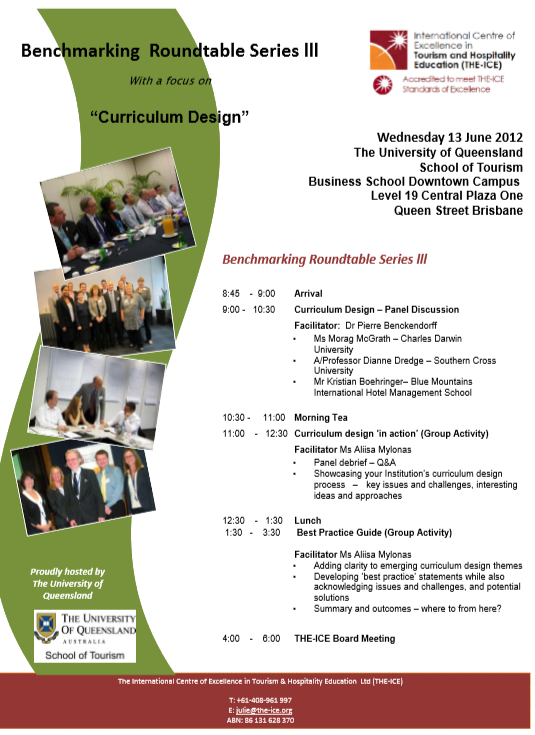
Proudly hosted by the School of Tourism at the University of Queensland in Brisbane, Australia, on 13 June 2012.
Focus:
- Curriculum Design
The workshop was attended by educators and researchers from vocational, private, and higher education sectors, who considered, discussed and debated the following key issues:
- How do different organisations approach the design of curriculum?
- What stakeholders are involved in curriculum design?
- How are curriculum design standards determined and benchmarked?
Esteemed guest presenters and facilitators included:
- Dr Pierre Benckendorff
- Ms Aliisa Mylonas
- Ms Morag McGrath, Charles Darwin University. View presentation.
- Assoc Prof Dianne Dredge, Associate Professor, School of Tourism and Hopsitality Management, Southern Cross University. View presentation.
- Mr Kristian Boehringer, Blue Mountains International Hotel Management School. View presentation.
Proudly hosted by:
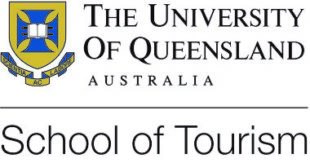
THE-ICE BRS II, 2011
Proudly hosted by William Angliss Institute in Melbourne, Australia, on 18 March 2011. Educators and researchers from both the vocational and higher education sectors attended the series on Internships and Industry Advisory Boards building on Series I discussions and outcomes.
Focus:
- Benchmarking Industry Connections, with a focus on Benchmarking Internships and Industry Advisory Boards.
Mr Tim Biddle facilitated a discussion around benchmarking the commonalities, differences, and emerging issues relating to internship structures across institutions, with the objective of identifying areas that can be benchmarked cross-institutionally, and identifying best practice.
The discussion also focused on the role, structure, assessment and industry-relevant issues relating to offering internships within tourism, hospitality and events courses, specifically:
- The objective, goals, and roles of internship within the curriculum.
- Preparing students for internship.
- Integration of internship into the curriculum.
- Timing, duration, and assessment of internships.
- Obligations of the institution, student, and industry partner.
- Review and feedback strategies on internship.
Additional issues that were discussed included:
- Developing internships for Masters degrees.
- Re-thinking the traditional internship.
- Industry confusion regarding differing institutional requirements.
- Issues of overseas internships.
Professor Perry Hobson facilitated a discussion around Industry Advisory Boards (IAB), which are a particular feature of tourism, hospitality, and events education. Such Boards can be found to exist at both the institutional level (for standalone hotel schools) or at the Department/School level within larger institutions. The issues discussed relating to benchmarking the role, structure, and activities of an Industry Advisory Board included:
- Purpose and role of the IAB.
- Terms of reference.
- Structure and size.
- Meeting schedule.
- Terms and length of appointment.
- Types of activities, involvement, and engagement.
- Review process of the IAB.
Proudly hosted by:
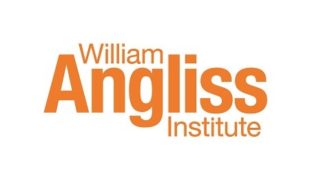
THE-ICE BRS I, 2010
Proudly hosted by Northern Sydney Institute of TAFE in Sydney, Australia, on 23 November, 2010.
Focus:
- Benchmarking Industry Connections, with a focus on Benchmarking Internships and Industry Advisory Boards.
Proudly hosted by:
